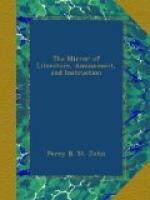THE NATURALIST.
* * * * *
POISON OF THE HORNED VIPER.
(Cerastes Coluber.)
Mr. Madden, whilst in Thebes, killed one of these animals, for the purpose of extracting its poison, which he found in a small membrane in the front of the jaw under the two hollow teeth. Having collected the venom carefully on a piece of glass, he examined it with a microscope, and found it to consist of sharp, saline spiculae, of a reticular appearance, extremely minute. “Half of this I gave to a dog, in a piece of meat—it produced no sensible effect; I then diluted the remainder, smeared the point of a lancet with it, and wounded the dog in the shoulder: this application he only survived three hours."’—Madden’s Travels.
Medicus.
* * * * *
FISH BATTLE.
Captain Crow, in a work published a short time since, relates the following as having occurred on a voyage to Memel:—“One morning during a cairn, when near the Hebrides, all hands were called up at three o’clock, to witness a battle between several of the fish called thrashers and some sword-fish on one side, and an enormous whale on the other. It was in the middle of summer, and the weather being clear, and the fish close to the vessel, we had a fine opportunity of witnessing the contest. As soon as the whale’s back appeared above the water, the thrashers, springing several yards into the air, descended with great violence upon the object of their rancour, and inflicted upon him the most severe slaps with their tails, the sound of which resembled the reports of muskets fired at a distance. The sword-fish, in their turn, attacked the distressed whale, stabbing him from below;—and thus beset on all sides, and wounded, when the poor creature appeared, the water around him was dyed with blood. In this manner they continued tormenting and wounding him for many hours, until we lost sight of him; and I have no doubt they, in the end, accomplished his destruction.”
W.G.C.
* * * * *
NOTES OF A READER.
* * * * *
INFLUENCE OF THE MIND ON THE BODY.
“Should the body sue the mind before a court of judicature, for damages, it would be found that the mind would prove to have been a ruinous tenant to its landlord.”—Plutarch.
[We abridge these interesting facts from “An Inquiry into the Influence of the Mind and Passions on the Body, in the production of Disease”—in No. 11 of the London Medical and Surgical Journal.[1] The whole paper is written in as clear, concise, and popular a style as the subject will allow, and its importance demands the attention of the reader; although we have not thought it to our purpose to follow the writer to the main object—or how these causes operate in the production of disease.]




